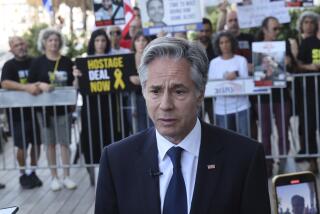Karabakh Rejects Peace Plan OKd by Armenia, Azerbaijan
MOSCOW — Nagorno-Karabakh, a belligerent in Europe’s longest-running ethnic war, flatly rejected a U.S.-backed peace plan on Wednesday as too dangerous for its civilian population.
The refusal by the Armenian-populated enclave in Azerbaijani territory appeared to torpedo chances for implementation of the American-Russian-Turkish initiative, which was intended to end five years of fighting that has killed more than 3,000 people.
Armenia and Azerbaijan, the other parties involved in the dispute, accepted the plan.
The blueprint would have required the withdrawal starting this Saturday of ethnic Armenian fighters from the Kelbadzhar region of Azerbaijan, which was seized in a March offensive that put 10% of Azerbaijani territory into the hands of Karabakh fighters.
The Armenians have argued that holding the strip dividing Nagorno-Karabakh from Armenia proper is vital to preventing Azerbaijani attacks on Armenian positions and for ensuring the resupply of Karabakh, a mountainous, rural region.
Robert Kocharyan, chairman of Nagorno-Karabakh’s State Defense Committee, said the enclave decided to reject the tripartite peace plan “because it does not ensure observation of security for the peaceful population.”
As it now stands, the plan would allow only lightly armed Azerbaijani police officers and international observers into the Kelbadzhar region--a stipulation Karabakh leaders feel would not guarantee protection from future attacks.
In a telephone interview, Manvel Sarkisyan, Nagorno-Karabakh’s envoy to Armenia, said his government also informed the United States that the initiative could not be accepted as long as Turkey is one of its sponsors.
“Turkey has blocked all the routes for the humanitarian aid that was to come to Armenia via Turkey,” Sarkisyan charged. “Meanwhile, Turkey has stepped up assistance to Azerbaijan,” a fellow Muslim country.
“If Turkey unblocks the roads and lets the aid through, we could start discussing this initiative seriously,” Sarkisyan said.
In addition, the Karabakh representative objected that, unlike a similar U.N. resolution designed to end the fighting, the tripartite plan does not insist on an end to Azerbaijan’s economic blockade of Armenia and Nagorno-Karabakh.
The peace plan would mandate a two-month cease-fire in all locations starting June 1 and unofficial negotiations in Geneva under the aegis of the United States, Russia and Turkey. Formal talks would be held in Rome.
Azerbaijan, which said Wednesday that it would sign the plan, announced that it has ordered its troops to stop firing until midnight Friday as a goodwill gesture. Sarkisyan said Karabakh forces have observed a unilateral cease-fire for the past 15 days.
Nonetheless, each side accused the other Wednesday of engaging in acts of war.
Times Moscow Bureau reporter Sergei L. Loiko contributed to this report.
More to Read
Sign up for Essential California
The most important California stories and recommendations in your inbox every morning.
You may occasionally receive promotional content from the Los Angeles Times.










